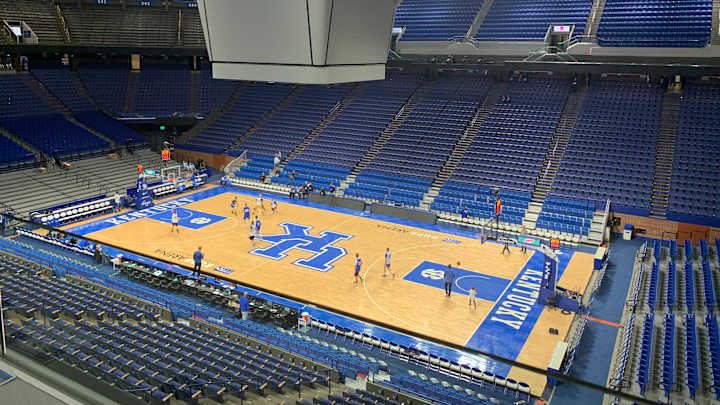History, More Than One Man or His Name

Rupp Arena has been home to the Wildcats all my life, so when a story surfaced that African-American and African Studies faculty at the University of Kentucky sent a letter to the school's president asking for the name to be changed, it got me thinking.
Already we have seen Ole Miss remove "Johnny Rebel," replacing him with a black bear mascot. Recently the University of Georgia Marching Band stated that they would no longer play "Tara's Theme" from the movie Gone With the Wind, while the University of Florida is ending their use of the "gator bait" cheer at all athletic events.
I'm all for change when needed. I'm for the inclusion and equality of all man, and women-kind. If these institutions feel the need to discontinue the use of these things, so be it.
Could Rupp Arena be next?
In college basketball, there are four iconic names that, when mentioned, fans of the sport instantly know which school calls them home.
Pauley Pavillion at UCLA, Cameron Indoor Stadium at Duke, Allen Fieldhouse at Kansas, and Rupp Arena.
The university does not own the "home of the Wildcats," and the school, while holding influence in the matter, can not just change the name. That process would likely take something akin to a miracle before the money folks who own the facility and the naming rights associated with it will change its name.
If those in power in Lexington decide to make a change, will they remove all records of Rupp in Kentucky basketball?
Will they send back the championship trophies and banners he won?
Should his plaque be removed from the Naismith Memorial Basketball Hall of Fame?
Exactly how far should Kentucky go to remove the history of Rupp?
That history also included one nugget of fact that was a turning point for college basketball.
Remember the story of Texas Western?
It's a story of an all-Black team and head coach Don Haskins, where he and his upstart team were supposedly no match for the all-white Kentucky team led by Rupp in 1966.
However, Texas Western won the game 72-65 and set about the acceleration of the ongoing integration movement in college basketball. It also changed the overall recruiting approach of teams nationally, including Kentucky where Rupp would sign Tom Payne, his first Black player just three years later in 1969 after missing on other Black athletes between 1966 and 1969.
Payne would go on to the NBA before getting into legal trouble and spending the better part of his life in prison after being convicted of rape in Georgia and also being convicted of the same charge for another rape in Lexington. More on this in a moment.
I have no defense of Rupp for anything he might have said and done. After all, he left Kentucky in 1972, when I was all of four years old. I don't remember much about the man other than what history can teach me.
That history, good and bad, should serve as a reminder to us as a nation, of what we never want to endure again. When we begin erasing it, where do we stop?
Can we erase Rupp yet leave Texas Western's incredible accomplishment intact without changing the context? After all, without Rupp as the villain and racism as the backdrop, the story of the Miners would not carry the same meaning today.
For what's it's worth, former LSU head basketball coach Dale Brown insisted that Rupp was no racist. In an interview after he retired from coaching, Brown shared the story of he and one of his former LSU players visiting Payne in a Kentucky prison.
“Tom (Payne) told me one time that everybody brought up about Adolph Rupp being a racist,” Brown recalled in the article linked above. “Tom said, ‘He was not. He was the only person who communicated with me and my mother when I was in trouble. Adolph Rupp was the only one. You don’t forget that.’”
Granted, I have no verification of Brown's story or the reputation of the author, but if that story is true, then perhaps what many people believe of Rupp has been wrong for decades.
Either way, if the powers that be in Lexington decide to change the name to Wildcat Arena, or whatever, I'm okay with it. If they refuse to change and leave Rupp's name on the walls, it won't impact me
Whatever happens, the next time Vanderbilt visits Lexington, I'll take my seat and do my job regardless of the name on the outside of the building. I'm also guessing that the Wildcat players, who for decades have been comprised of many Black players will continue to perform to their best of their abilities too.
Follow Greg on Twitter @GregAriasSports and @SIVanderbilt or Facebook at Vanderbilt Commodores-Maven.

A 29 year veteran of radio in the Middle Tennessee area and 16 years in digital and internet media having covered the Tennessee Titans for Scout Media and TitanInsider.com before joining the Sports Illustrated family of networks.